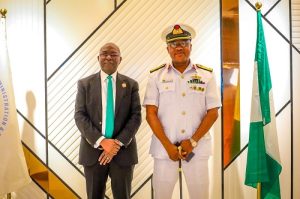NNPC Considers Indigenous Coys’ Participation in Crude Oil, Fuel Imports Affreightment

• Measure will bring multiplier effect on economy, says Ex-NISA President
There are strong indications that indigenous shipping companies which have capacity for crude oil affreightment may be allowed to do so by the Nigerian National Petroleum Corporation (NNPC) in a question of time.
Indigenous companies are also to be given the chance to provide bottoms for refined fuel imports.
This indication followed the inclusion of the clause by the NNPC in the trade terms under which crude oil buyers take delivery of the wet cargo and importation of refined fuel into the counry.
In crude oil, the current terms of trade is FOB which allows only the foreign buyers to determine who carries the wet cargo, a development that has left Nigerians in the cold in the lucrative trade.
The former President of the Nigerian Indigenous Shipowners Association of (NISA) and Chairman, Sea Transport Group, Alhaji Aminu Umar, in an interview with One Page Africa said that Nigerian companies in the clause are allowed to be part of the bidding list.
Umar who described this as a good development, recalled that in the past no one had heard of Nigerians participating in the lucrative trade as it involves export and import of the wet cargo.
He explained, “ this clause is not about cabotage, it is international trade, particularly import and export of wet cargo in the country. In years back, you couldn’t hear about a Nigerian participating in this, and this is just a step in the clamour for the change of the nation’s trade terms (FOB to CIF)”.
Aminu applauded the chief executives of Nigerian Maritime Administration and Safety Agency ( NIMASA), Nigerian Shippers’ Council, the NCDMB for this, saying they were the ones that have pushed to make sure that those clauses were provided for and implemented.
He said the Nigerian shipowners association and many other Nigerians fought for this.
He said, “this is more or less saying the Nigerian ship-owner should be given the support to be the one to bring the ship when the nation’s cargo is to be imported. The NNPC GMD also deserves commendation because he is the first GMD to be able to pull this through. This GMD has shown support for local capacity building. And we ate saying that by doing this, you are not only saving the Nigerian economy the a lot of foreign exchange or capital outflow, you are creating jobs and building capacity”.
Aminu said this will impact positively to the nation’s economy and growth of the indigenous shipping.
He pointed out that with the number of vessels that are involved in the trade, Nigeria’s participation will be a big boom for the economy.
He said, “Let me give this example. NNPC import of clean petroleum product in 2020, the vessels that called Nigeria to discharge cargo was not less than 700. That translates into more than 60 vessels in a month, which means two vessels every day. Assuming these vessels that have called to discharge cargo meant for Nigeria, each vessel has at least 25 persons working on board. And even if you say there are chances that the vessels would go and come back, so let’s even say one third of it are the vessels that call, you are talking of not less than 250. So, multiply 250 by 25 people, which tells you the number of Nigerians who might likely get jobs.
Even if Nigerians provide only 30% of these vessels or say in 2021 or 2022 Nigerians provide 20% and graduates over the years, it tells you the number.
“Don’t forget, these 25 are the ones who are working directly on the ship. There are people working in the office, there are support staff. There are so many indirect jobs that this creates. Not to talk of the revenue generated by this, which today is paid out of our economy. If you estimate, it is billions of Dollars that Nigeria pays out to other economies, which ordinarily if we are going to save 20% of it, is something. Because we need it in this economy.
Now, are there concerns about capacity to be able to take on the jobs that would be created?”.
”There should be a deliberate policy to Nigerianise some of this. And through that we build capacity. I can give you example, and we go down the history lane. In years back how many Nigerians were doing exploration and production of petroleum? It was only Shell, ExxonMobil, Total, today there are Nigerians including Seplat, Amni, Conoil.
So, if we say that we must have capacity first before we Nigerianse things then it doesn’t work. There is nowhere in the world where they say there should be capacity first before they start it. What they say is we have a deliberate policy to start, hold hands, encourage and then gradually increase the capacity in both the investment and in Nigerianising it and by then Nigerians would have learned it. Same thing if you look at it in the ’60s, same thing, maybe it was only BBC and other foreign media that you have. Today, all the media houses have Nigerians doing the jobs. If not for deliberate policy it may not have been possible. That is what we want for shipping too”.
There are strong indications that indigenous shipping companies which have capacity for crude oil affreightment may be allowed to do so by the Nigerian National Petroleum Corporation (NNPC) in a question of time.
Indigenous companies are also to be given the chance to provide bottoms for refined fuel imports.
This indication followed the inclusion of the clause by the NNPC in the trade terms under which crude oil buyers take delivery of the wet cargo and importation of refined fuel into the counry.
In crude oil, the current terms of trade is FOB which allows only the foreign buyers to determine who carries the wet cargo, a development that has left Nigerians in the cold in the lucrative trade.
The former President of the Nigerian Indigenous Shipowners Association of (NISA) and Chairman, Sea Transport Group, Alhaji Aminu Umar, in an interview with One Page Africa said that Nigerian companies in the clause are allowed to be part of the bidding list.
Umar who described this as a good development, recalled that in the past no one had heard of Nigerians participating in the lucrative trade as it involves export and import of the wet cargo.
He explained, “ this clause is not about cabotage, it is international trade, particularly import and export of wet cargo in the country. In years back, you couldn’t hear about a Nigerian participating in this, and this is just a step in the clamour for the change of the nation’s trade terms (FOB to CIF)”.
Aminu applauded the chief executives of Nigerian Maritime Administration and Safety Agency ( NIMASA), Nigerian Shippers’ Council, the NCDMB for this, saying they were the ones that have pushed to make sure that those clauses were provided for and implemented.
He said the Nigerian shipowners association and many other Nigerians fought for this.
He said, “this is more or less saying the Nigerian ship-owner should be given the support to be the one to bring the ship when the nation’s cargo is to be imported. The NNPC GMD also deserves commendation because he is the first GMD to be able to pull this through. This GMD has shown support for local capacity building. And we ate saying that by doing this, you are not only saving the Nigerian economy the a lot of foreign exchange or capital outflow, you are creating jobs and building capacity”.
Aminu said this will impact positively to the nation’s economy and growth of the indigenous shipping.
He pointed out that with the number of vessels that are involved in the trade, Nigeria’s participation will be a big boom for the economy.
He said, “Let me give this example. NNPC import of clean petroleum product in 2020, the vessels that called Nigeria to discharge cargo was not less than 700. That translates into more than 60 vessels in a month, which means two vessels every day. Assuming these vessels that have called to discharge cargo meant for Nigeria, each vessel has at least 25 persons working on board. And even if you say there are chances that the vessels would go and come back, so let’s even say one third of it are the vessels that call, you are talking of not less than 250. So, multiply 250 by 25 people, which tells you the number of Nigerians who might likely get jobs.
Even if Nigerians provide only 30% of these vessels or say in 2021 or 2022 Nigerians provide 20% and graduates over the years, it tells you the number.
“Don’t forget, these 25 are the ones who are working directly on the ship. There are people working in the office, there are support staff. There are so many indirect jobs that this creates. Not to talk of the revenue generated by this, which today is paid out of our economy. If you estimate, it is billions of Dollars that Nigeria pays out to other economies, which ordinarily if we are going to save 20% of it, is something. Because we need it in this economy.
Now, are there concerns about capacity to be able to take on the jobs that would be created?”.
”There should be a deliberate policy to Nigerianise some of this. And through that we build capacity. I can give you example, and we go down the history lane. In years back how many Nigerians were doing exploration and production of petroleum? It was only Shell, ExxonMobil, Total, today there are Nigerians including Seplat, Amni, Conoil.
So, if we say that we must have capacity first before we Nigerianse things then it doesn’t work. There is nowhere in the world where they say there should be capacity first before they start it. What they say is we have a deliberate policy to start, hold hands, encourage and then gradually increase the capacity in both the investment and in Nigerianising it and by then Nigerians would have learned it. Same thing if you look at it in the ’60s, same thing, maybe it was only BBC and other foreign media that you have. Today, all the media houses have Nigerians doing the jobs. If not for deliberate policy it may not have been possible. That is what we want for shipping too”.





